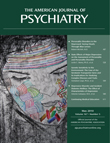To the Editor: Dual diagnosis may be the most pervasive and challenging problem we face in psychiatry that receives the least sufficient or coherent attention. In their article published in the January 2010 issue of the Journal, Denise A. Hien, Ph.D., et al. (
1) examined how improvement in posttraumatic stress disorder (PTSD) symptoms as a result of treatment affects substance use outcomes, exemplifying the sort of longitudinal, diagnostically inclusive experimental designs we need. However, I am left dazed and confused by the self-medication framework the article, and much of the best dual-diagnosis research, so dogmatically espouses.
The article begins with defining the importance of this research: "The co-occurrence of (PTSD) and substance use disorders is a major public health concern…because of negative physical and mental health consequences and poor treatment outcomes" (
1, p. 95). Yet, the main conclusion of the study was that PTSD patients use substances to self-medicate symptoms.
Initial PTSD symptom reduction often precedes substance use disorder reduction, while early substance use disorder improvement does not as robustly lead to PTSD symptom improvement. This is interpreted exclusively as evidence for self-medication. However, these data could reflect a change in a neurobiological state that drives both PTSD symptom severity and compulsive drug-taking that has nothing to do with whether substance use impacts PTSD symptoms in the same manner that treatment with medication affects these symptoms. Exclusive support for self-medication would require not a relative lack of PTSD symptom reduction after substance use disorder improvement (as shown in the article) but an increase in symptoms after substance use reduction (which was not shown). Following the self-medication framework, it was never mentioned that the results also showed that if substance use disorders initially decline either alone or along with declining PTSD symptoms, patients are less likely to relapse to a total (both PTSD and substance use disorder symptoms) nonresponse condition relative to what initial PTSD symptom-alone improvement predicts.
In the comparative treatments, trauma-focused/seeking safety versus health education, the former achieved superior efficacy for severe dual diagnosis. The authors explained that trauma-focused/seeking safety "is an integrated cognitive behavior approach that actively links PTSD symptoms with 'unsafe' substance use behavior" (
1, p. 97). This implies, as shown in bipolar patients (
2), that when cognitive-behavioral therapy (CBT) acts to dispel the notion that the link between psychiatric symptoms and substance use is somehow positive (e.g., that it represents self-medicating) and replaces it with a concept that it is detrimental (e.g., that it is a disorder), you actually get superior efficacy.
At baseline, more severe PTSD was associated with more severe substance abuse, a finding replicated often in the dual-diagnosis literature but once again interpreted only as evidence of self-medication. However, if we think about drugs proven to help psychiatric symptoms (i.e., psychiatric medications), we find that medication compliance (i.e., self-medication) is often actually worse with greater illness severity. Moreover, for these medications with which patients clearly use to self-medicate, it would be illogical to conclude that since the individuals taking the medications are sicker than the individuals who are not, the medications are actually being used to medicate the illness.

